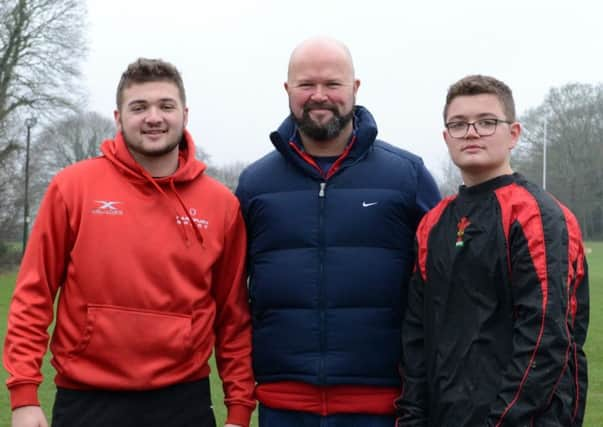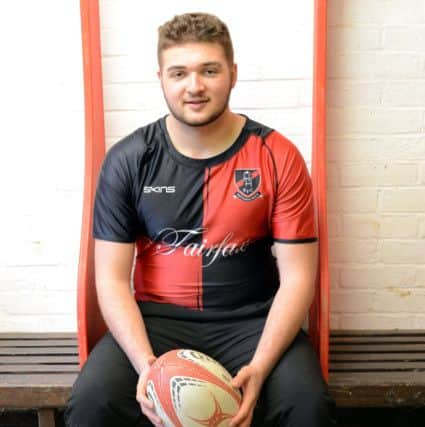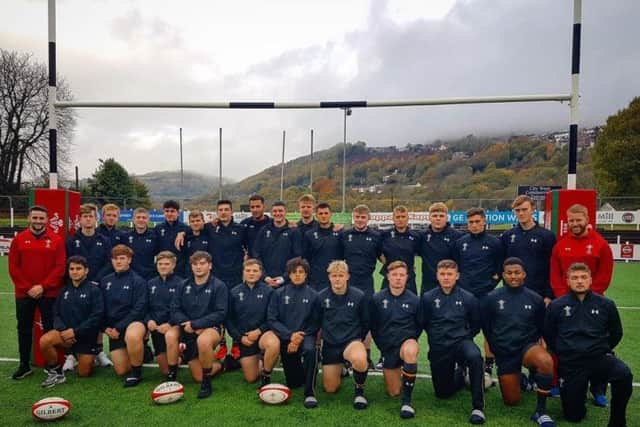Rugby dreams back on track for Rhys after knee surgery


Rhys Jones, 17, is a rising star in the rugby world who played for Rugby RFC, during which times he represented Sussex and the Welsh Exiles.
He is on the Rugby Union’s Young Rugby Ambassador Programme and is a coach for the Haywards Heath RFC under 15s.
Advertisement
Hide AdAdvertisement
Hide AdRhys, who lives in Maidenbower, started playing rugby when he was 11 years old and has already acquired two sponsorships.


He was picked to take part in the Welsh Exiles Super Six tournament - a selection process for the Welsh under-18s squad - but within his second game disaster struck.
Rhys slipped and twisted his right knee, tearing the cartilage on both sides. His parents, Wendy and Glen, watched in horror as he came limping out of the changing rooms only to sit on the side-lines for the rest of the tournament.
“There was a sharp pain at the beginning and then it became sore and uncomfortable to walk,” explained Rhys. “I couldn’t do any sport for weeks and felt like a caged animal and was really grumpy.”
Advertisement
Hide AdAdvertisement
Hide AdA meniscus (cartilage) tear in the knee is a common sports injury, particularly among footballers and rugby players, and in Rhys’s case he needed surgery.


Luckily his family had private health insurance and, following an assessment at Crawley Hospital, they chose to see orthopaedic surgeon Mr Sandeep Chauhan at Spire Gatwick Park Hospital in Horley. Rhys was also given an MRI scan, and three weeks later, on December 1, he had an arthroscopy and meniscectomy to remove a piece of the torn cartilage – a day procedure which takes around 15 minutes.
“The care at Spire Gatwick Park was spot on. I couldn’t fault it as they got me through so quickly. I have friends at college who have had similar injuries and they are still waiting for their operations,” said Rhys, who is in his first year at Hartpury in Gloucester, one of the UK’s leading sports colleges.
After the surgery Rhys had one-to-one sessions with Spire Gatwick Park’s physiotherapists.
Advertisement
Hide AdAdvertisement
Hide AdJust after Christmas he played his first non-contact game for Hartpury on artificial grass and within a few weeks he was back at Haywards Heath RFC in Cuckfield, enjoying a non-contact friendly on grass in icy rain and temperatures of zero degrees. And he is aiming to get his first contact match in the bag by April before the rugby season draws to a close.
“I think that is long enough time for the injury to heal and time for physio to sort out any issues,” he says.
Rugby is the cornerstone of the Jones family. His dad Glen is a Director of Rugby at Collyer’s College in Horsham and a coach for both Haywards Heath and Sussex RFU. Rhys’s grandad is Mike Jones, who played high level rugby with the famous Neath RFC and Wales A in the 1960s. And Rhys’s younger brother Samuel is already showing potential in the Haywards Heath under 15s. Mum Wendy volunteers at the bar at Haywards Heath RFC so she can spend the weekends with her boys.
All the family, especially Rhys, believe his knee injury to be a temporary setback in his rugby career and are already hoping for a return trip to the Super Six tournament in Wales next November.
Advertisement
Hide AdAdvertisement
Hide Ad“All elite levels of sport have their ups and downs,” says Rhys. “I want to be a professional rugby player and would love to go as high as I can go, but as long as I can continue to play rugby I will be happy.”
Consultant orthopaedic surgeon, Mr Sandeep Chauhan, of Spire Gatwick Park Hospital said: “A meniscus tear is a common injury among young footballers and rugby players when the knee twists during play. I see this type of injury every few weeks. Patients will be walking within one week of their operation, cycling within two, jogging within three to five weeks, and back to normal within six to twelve weeks. They need to have physiotherapy twice a week for up to six weeks. I am fully confident Rhys will be back to doing what he’s been doing.”